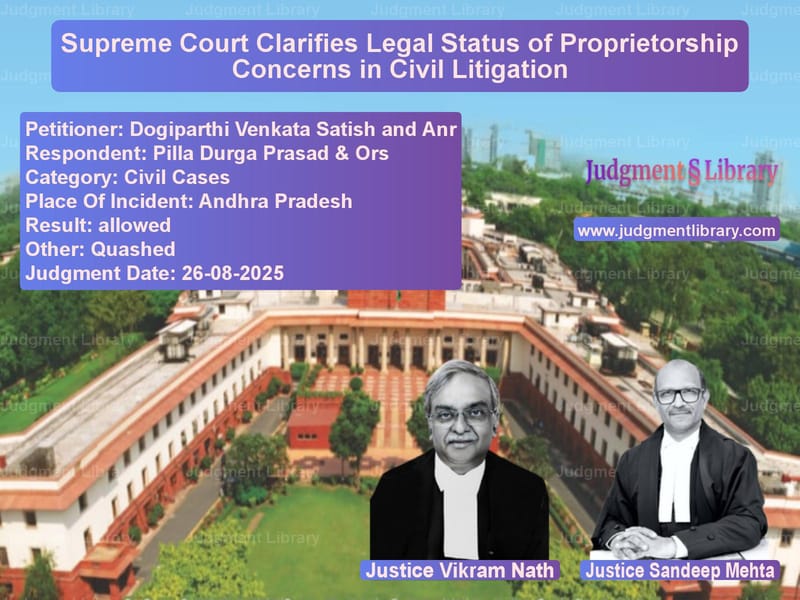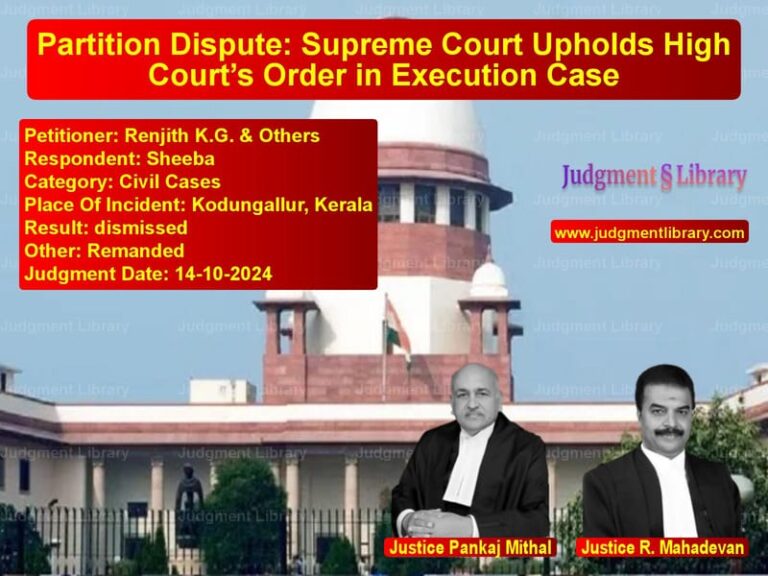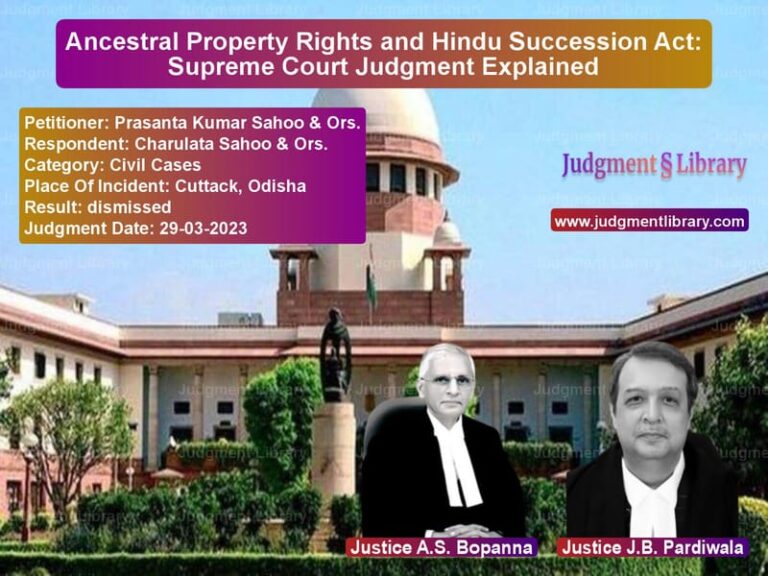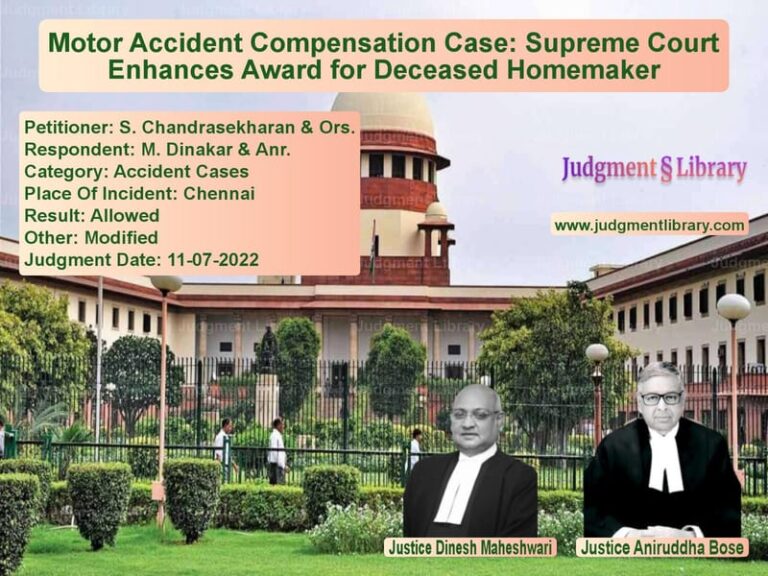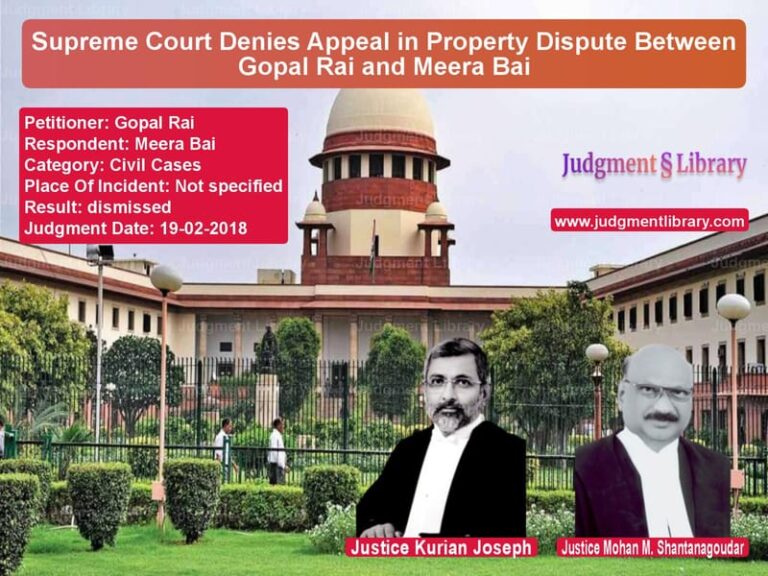Supreme Court Clarifies Legal Status of Proprietorship Concerns in Civil Litigation
In a significant ruling that clarifies the legal status of proprietorship concerns in civil litigation, the Supreme Court of India has overturned a High Court decision that had rejected a plaint on hyper-technical grounds. The judgment, delivered on August 26, 2025, provides crucial clarity on how proprietorship firms should be treated in legal proceedings and emphasizes that courts should focus on substantive justice rather than technicalities.
The case originated from a property dispute between Dogiparthi Venkata Satish (the property owner) and Pilla Durga Prasad, who operated a business under the name ‘Aditya Motors’. The controversy began when the property owner leased his premises to Aditya Motors through a registered lease deed dated April 13, 2005. After the lease period expired and the tenant failed to vacate, the owner filed a suit for eviction against Aditya Motors and other parties who had been inducted into the property.
During the legal proceedings, an important development occurred when the plaintiff sought to amend the plaint to delete ‘Aditya Motors’ as defendant no. 1 and substitute Pilla Durga Prasad in its place. This amendment was allowed by the Trial Court on March 28, 2018, and since this order was not challenged, it attained finality. However, this amendment became the center of the legal controversy that eventually reached the Supreme Court.
Following the amendment, the defendant filed an application under Order VII Rule 11 of the Code of Civil Procedure seeking rejection of the plaint. The defendant argued that since the registered lease deed was originally with Aditya Motors and now the plaint had been amended to delete Aditya Motors and substitute Pilla Durga Prasad, the plaint no longer disclosed any cause of action against Pilla Durga Prasad.
The appellants objected to this application, presenting a compelling argument that Aditya Motors was a proprietorship concern with Pilla Durga Prasad as its sole proprietor. Since a proprietorship concern is not a juristic person, it wouldn’t make any difference if the proprietor was made a party as representative of Aditya Motors. The appellants emphasized that the cause of action was actually against Pilla Durga Prasad as he alone was the signatory to the registered lease deed. Pilla Durga Prasad being the proprietor of Aditya Motors and he having signed the registered lease deed as representative and proprietor of Aditya Motors, the application under Order VII Rule 11 CPC was liable to be rejected. The cause of action, if any, was always against the proprietor and not the firm.
The Trial Court agreed with the appellants and rejected the application to dismiss the plaint. However, the defendant approached the High Court, which took a different view. The High Court allowed the revision petition, relying primarily on the provisions of Order XXX Rule 10 of the CPC. According to the High Court, the proprietorship concern ought to have been made a party as it could be sued but it could not sue on its own. This decision led the property owners to approach the Supreme Court.
The Supreme Court, after hearing arguments from both sides, delivered a comprehensive judgment that clarified several important legal principles regarding proprietorship concerns. The Court began by stating that in our considered opinion, the Trial Court was right in rejecting the application under Order VII Rule 11 CPC. The High Court committed serious error in relying upon Order XXX Rule 10 CPC.
The Court provided a detailed analysis of the legal status of proprietorship concerns, stating that A proprietorship concern is nothing, but a trade name given by an individual for carrying on his business. A proprietorship concern is not a juristic person. It cannot sue, however, in view of Order XXX Rule 10 CPC, it can be sued.
The Court examined Order XXX Rule 10 CPC, which states: “10. Suit against person carrying on business in name other than his own.—Any person carrying on business in a name or style other than his own name, or a Hindu undivided family carrying on business under any name, may be sued in such name or style as if it were a firm name, and, in so far as the nature of such case permits, all rules under this Order shall apply accordingly.”
Interpreting this provision, the Court made a crucial distinction: The use of the word can in Order XXX Rule 10 CPC only indicates that proprietorship concern may be made a party. However, it does not necessarily mean that the proprietor itself if made a party would not be enough, inasmuch as, the proprietorship is to be defended by the proprietor only and not by anybody else. Once the proprietor has been impleaded as a party representing the proprietorship, no prejudice is caused to rather its interest is well protected and taken care of by the only and only person, who owns the proprietorship. Order XXX Rule 10 CPC does not in any manner debar a suit being filed against the proprietor.
The Court emphasized that It is well settled by series of judgments that proprietorship concern cannot be equated either with a company or with a partnership firm. Order XXX deals with partnership basically, however, Rule 10 thereof refers to proprietorship. It makes very clear that proprietorship concern cannot sue but it can be sued. Whether proprietorship concern is sued in its name or through its proprietor representing the concerned is one of the same thing.
The Supreme Court strongly criticized the High Court’s approach, noting that The High Court seems to have taken completely hyper technical view not realising that there was no prejudice caused and the cause of action very much accrued against the proprietor as he alone had signed the lease deed on behalf of the proprietorship concern and there was no involvement of any second or third party, whose interest could be said to have been prejudicially affected. Once the interest of the proprietorship concern was taken care of by the proprietor having been impleaded nothing further remained.
To support its reasoning, the Court referenced its earlier decision in Ashok Transport Agency v. Awadhesh Kumar and another, where it was explained that a proprietary concern is only a business name and that Order XXX Rule 10 is merely enabling, the real party being the proprietor. The Court quoted extensively from this precedent: “A partnership firm differs from a proprietary concern owned by an individual. A partnership is governed by the provisions of the Indian Partnership Act, 1932. Though a partnership is not a juristic person but Order XXX Rule 1 CPC enables the partners of a partnership firm to sue or to be sued in the name of the firm. A proprietary concern is only the business name in which the proprietor of the business carries on the business. A suit by or against a proprietary concern is by or against the proprietor of the business.”
The judgment further elaborated: “The provisions of Rule 10 of Order XXX which make applicable the provisions of Order XXX to a proprietary concern, enable the proprietor of a proprietary business to be sued in the business names of his proprietary concern. The real party who is being sued is the proprietor of the said business. The said provision does not have the effect of converting the proprietary business into a partnership firm.”
The Court also referenced Shankar Finance and Investments v. State of Andhra Pradesh and others, where it was emphasized that in proceedings involving proprietary concerns, representation may be in the trade name or through an authorised agent with personal knowledge, yet the proprietor remains the real party in interest.
The Supreme Court’s decision reinforces the principle that procedural technicalities should not defeat substantive justice. By allowing the appeal and setting aside the High Court’s order, the Court ensured that the eviction suit could proceed on its merits rather than being dismissed on a technical ground that didn’t affect the substance of the dispute.
This judgment has significant implications for business owners operating as sole proprietors and for landlords dealing with such businesses. It clarifies that while a proprietorship concern can be sued in its business name under Order XXX Rule 10 CPC, there’s no legal requirement to do so. Suing the proprietor directly is equally valid since the proprietorship concern has no separate legal existence from its owner.
The ruling also serves as an important reminder to courts at all levels to avoid hyper-technical interpretations of procedural laws that could defeat the ends of justice. As the Supreme Court noted, the High Court’s approach failed to recognize that no prejudice was caused to the defendant by substituting the proprietor for the business name, since they were essentially the same party.
In practical terms, this judgment provides greater clarity and flexibility in litigation involving proprietorship concerns. It acknowledges the reality that many small businesses operate as sole proprietorships and that the legal system should accommodate this common business structure without imposing unnecessary procedural hurdles.
The Supreme Court’s decision to allow the appeal and restore the Trial Court’s order means that the eviction suit will now proceed to be heard on its merits. The Trial Court has been directed to decide the suit based on the substantive issues rather than procedural technicalities, ensuring that both parties have their day in court to present their case properly.
This judgment represents a significant contribution to Indian civil procedure jurisprudence, particularly in the context of business entities and their legal treatment. By clarifying the status of proprietorship concerns and emphasizing substance over form, the Supreme Court has promoted access to justice and prevented the misuse of procedural provisions to defeat legitimate claims.
Petitioner Name: Dogiparthi Venkata Satish and Anr.Respondent Name: Pilla Durga Prasad & Ors.Judgment By: Justice Vikram Nath, Justice Sandeep Mehta.Place Of Incident: Andhra Pradesh.Judgment Date: 26-08-2025.Result: allowed.
Don’t miss out on the full details! Download the complete judgment in PDF format below and gain valuable insights instantly!
Download Judgment: dogiparthi-venkata-s-vs-pilla-durga-prasad-&-supreme-court-of-india-judgment-dated-26-08-2025.pdf
Directly Download Judgment: Directly download this Judgment
See all petitions in Contract Disputes
See all petitions in Property Disputes
See all petitions in Landlord-Tenant Disputes
See all petitions in Lease Agreements
See all petitions in Judgment by Vikram Nath
See all petitions in Judgment by Sandeep Mehta
See all petitions in allowed
See all petitions in Quashed
See all petitions in supreme court of India judgments August 2025
See all petitions in 2025 judgments
See all posts in Civil Cases Category
See all allowed petitions in Civil Cases Category
See all Dismissed petitions in Civil Cases Category
See all partially allowed petitions in Civil Cases Category

